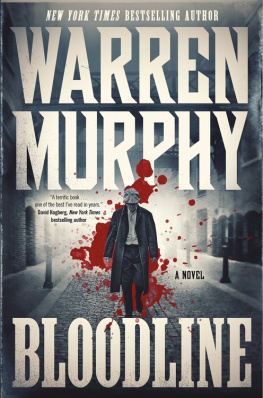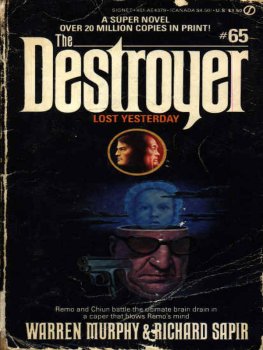Destroyer 115: Misfortune Teller
By Warren Murphy and Richard Sapir
Chapter 1
When a political insider told Michael Princippi that after losing the 1988 presidential race he had as much chance as Mickey Mouse of getting himself renominated to the same lofty post, he sneered condescendingly and boasted a superior knowledge of politics.
When a newspaper columnist pointed out to Michael Princippi that after finally being passed over as a "never-ran" in both 1992 and 1996 he had about as much of a chance of staging a comeback in the year 2000 as Halley's Comet, silent movies and the dodo, he told the man to eat his political dust.
And when, on the day that would begin the strongest push for unification of North and South Korea since 1946 and would also spark a near meltdown between the U.S. and both Korean governments, someone told him that he would soon achieve a power he could never understand and release a force so deadly that it could quite literally mean the destruction of civilization, he would have said that it was about damned time. But what he truly needed to get the ball rolling was for someone to sign his nomination papers.
"It's a bit premature, wouldn't you say, Governor?" his lawyer asked him guardedly on that fateful afternoon.
"What are you talking about?" Princippi demanded. He was a slight man who stood five foot two in his stocking feet and had the personality of a clogged shower drain.
"Well, people still remember you," the lawyer said, uncomfortable with having to broach the subject. "Maybe we should wait a few more decades. I hear they're doing some amazing things with cryonics these days," he suggested amiably.
Princippi's fish-belly face soured. "Where did you go to law school?" he asked.
The lawyer stiffened. "Is that really relevant?" he asked. It was a sensitive subject. The attorney knew that Princippi had at one time had access to the best legal minds in Massachusetts. The former governor had found his current attorney in a booth at the local Sears.
Princippi shook his head. "Look, my mind is made up. The stage is set for the comeback of the century. Of the next century," he added.
"Maybe," the lawyer said. He did not sound convinced.
As he appraised the attorney, Princippi's eyes suddenly narrowed. The lawyer was sitting on a wobbly old chair in the ex-governor's Brookline, Massachusetts, kitchen.
"Is it raining out?" asked the man once known as "the Prince" by his constituents.
Princippi had just noticed that the lawyer's cheaply tailored, off-the-rack suit appeared to be soaked right through. A few roundish patches glistened under the dirty white sunlight that poured through the filthy kitchen window. The attorney shifted. His shoes squished.
"Not really," he hedged. He carried his arms away from his sides, deliberately keeping his hands away from the slick-appearing wetness of his suit.
"Why are you soaking wet? Jesus, you're getting water all over my floor!"
The lawyer sighed. "It's saliva, sir," he said. In deference to his client, he lifted his shoes so that only the tips touched the ancient, cracked linoleum.
Princippi's bushy black eyebrows bullied their way up onto his forehead. "What?" he asked.
The lawyer decided not to sugarcoat his reply. "Those nomination papers you gave me for people to sign? I told pedestrians they were for you, just as you instructed." He paused, suddenly unsure whether or not he should go on.
"And?" Princippi stressed.
"They spit on me," the lawyer blurted out. "A lot. I think some people circled the block just to take a second run." He glanced down at his oozing wet suit.
Princippi shook his head firmly. "No, no, no," he insisted, his eyes beginning to glaze over. "No. That simply cannot be true. Did you tell them that the papers were for their Prince?"
"I did everything you told me."
"You did something wrong." Princippi appeared to have dropped into a daydream. He stared blankly into space as his attorney spoke.
"Yes," the lawyer sniffed tartly. "I allowed you to draw me away from my practice. My booth at Sears wasn't much, but at least I didn't have people hocking loogies on me all day. This is revolting." He picked up his faux-leather plastic briefcase from the Formica tabletop and tipped it to one side. Viscous liquid slopped out of a hole in one corner, puddling into the musty, dirt-encrusted linoleum cracks in the floor. "These people hate you," the lawyer added. With a loud slap, he dropped the briefcase back to the table's surface.
Princippi did not appear to notice his lawyer's outburst. He was lost in thought.
In times of intense personal strife, he had a habit of winking out of reality for long moments. He considered it to be a psychological defense mechanism. It shielded him from the vicissitudes of a painful world. A psychiatrist might have better described it as a grand delusion.
He was having "the Dream."
Princippi was in the Oval Office. Standing at the window in silhouette. JFK, circa 1961 and 1962-Bay of Pigs, Cuban Missile Crisis. Very statesmanlike.
The brightness of the sun streaming through the window exploded around his image, enveloping it, obliterating it. Nothing remained. Just a sheet of blinding whiteness.
All gone. Snatched away in a heartbeat. He had nearly had it all. Now he had nothing. Just a crumbling house and a two-bit mall lawyer.
The trance was broken. Michael Princippi was back in his grimy kitchen. He was staring at the filthy floor. His eyes were focused on a pair of soaking-wet shoes.
Princippi did not even raise his head as he spoke.
"You are discharged from my service," he informed the lawyer, his face a somber mask. "Please type up a letter of resignation."
The lawyer snorted derisively. "Yeah, I'll get right on it," he mocked. "First, there's the matter of my fee."
"Yes, yes, yes," Princippi said, waving his hand dismissively. "Take it up with Doris."
"Doris quit last week. You hadn't paid her in three months."
"My wife, then."
"She's still in rehab, Governor. Remember the paint incident?"
Princippi looked up. His eyes betrayed his concern that the latest episode involving his substance abusing wife might become public. "Get it out of the slush fund," he said.
"The slush fund melted," the lawyer said. "And before you take the Doris route with me, I'm sure the Boston Messenger would be interested in some of the dirt I've seen around here. Especially concerning your lovely wife."
"Y-you're a lawyer," Princippi stammered. "You can't betray a confidence like that."
"You hired me as a campaign staffer after you hired me as a lawyer," the attorney pointed out. "Campaign staffers aren't bound by confidentiality."
"I'll sue."
"Great. Who's going to represent you?" The lawyer crossed his arms across his wet chest and waited smugly.
Princippi sat gasping for a few long moments, lost for an appropriate response.
Finally, he simply got up. He left the aluminum folding lawn chair with the clumps of frayed nylon that hung from beneath in cobweblike clumps and walked silently up to his bedroom. His feet were lead.
He found a few hundred dollars in an old envelope stashed between his ratty mattress and creaking box spring. He was downstairs with the cash a few moments later.
"Viper," the ex-governor spit morosely as he turned over the wad of crumpled bills.
"Pleasure doing business with you," the lawyer said. He stuffed the money in his soggy pocket. Quickly, he gathered up his briefcase and left.
After he was gone, Princippi sunk to his cheap aluminum kitchen chair. He stared dejectedly at the floor, images of abject poverty battling the Dream for control of his thoughts. Poverty won out.
As he sat in gloomy depression, a few nylon straps snapped beneath his bottom. He barely noticed.
Next page



